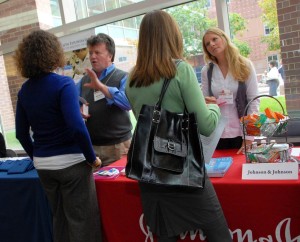Many of you have successfully identified either short-term or long-term career goals but can still struggle with how to “get from here to there” with your plans. If you stop to think about it, you can probably identify some of the things that have helped you achieved past goals you have set for yourself.
What helps us achieve a goal or purpose?
- Clarity of understanding, enthusiasm or motivation for a goal
- Information and access to resources
- Ability to take risks and to take action
- Accountability (holding self to course of action)
- Ability to learn from experience, gain insight
- Recognition of accomplishment (keeps us motivated to tackle the next thing on our list)
A mentor or advisor is someone who can add to our abilities in each of the areas above; who can accelerate the process of attaining goals, minimize both the effects and frequency of derailments, and expand our knowledge as we progress from goal to goal, and celebrate achievements. That being said, most mentors and advisors do not have every skill or expertise you will need to develop to move ahead in your own professional development. For example, a great researcher isn’t always a great communicator; a great writer may not be a great connector. This is where the idea behind having a personal board of advisors for your career comes in: rather than relying on a single advisor, you are more likely to succeed if you reach out to more people, and have their complementary skills and strengths serve your varying needs and goals. This is a very strategic form of networking for professional development.
Does this idea intrigue you? Here are some guidelines for creating a personal board of advisors for your career:
- Identify people with strengths or experience you seek
- Identify people with connections to others, or connections to resources that can help you
- Identify people you respect but who have differing perspectives than your own
- Identify people who will help you stay accountable
Think about a consortium of 4-5 people that would together have the expertise to meet your short term, and even some long term goals. Who do you already know that fits one or more of the above criteria? Personal advisory boards can be made up of individuals from any part of your life; not just school or work: family, friends, teachers, former supervisors, current advisors, coaches, leaders in certain fields of interest, alumni of your school or program.
For example, one of my current career goals is to develop my strengths related to leading a team. My board of advisors currently looks like this:
- 2 former supervisors who have a lot of experience in my field, career counseling graduate students (strengths and connections)
- 1 cousin, who has significant managerial experience in a totally different field, management consulting (differing perspectives)
- 2 friends from graduate school, who provide psychological support, have seen my career grow over time (more than 15 years!), and serve as “cheerleaders” (keep me accountable, recognize accomplishments)
What do you need to do to make the most of the “wisdom” or strengths of your career advisory board?
- Be prepared to discuss your goal(s)
- Develop the ability to discuss both strengths and weakness; self-insight is required for this
- Be open to feedback; and be willing to do things differently or see things differently
- Have regular contact, including follow up after each interaction
- Express gratitude and reciprocity (be engaged, appreciate your advisors’ efforts, and even offer to help others)
For more information on this concept, read some of the many articles online (some great ones are linked below), and share your networking and professional development goals by making an appointment with a Penn Career Services advisor: http://www.vpul.upenn.edu/careerservices/appointments
Personal Board of Advisors articles:
- Looking Out for Number One: http://www.jimcollins.com/article_topics/articles/looking-out.html
- Assembling Your Personal Board of Advisors: http://sloanreview.mit.edu/article/assembling-your-personal-board-of-advisors/
- Five Rules for Selecting Your Personal Board of Directors: http://www.forbes.com/sites/theyec/2014/07/16/five-rules-for-selecting-your-personal-board-of-directors/
- Create a Personal Board of Directors: http://www.fastcompany.com/62556/create-personal-board-directors
- Personal Board of Directors: http://www.astridbaumgardner.com/articles/10-articles/53-personal-board-of-directors.html
- Hire a Personal Board of Directors (Because You’re the CEO of your Career): http://flynnheath.com/wp-content/uploads/2013/05/Build-Your-Board-FHH-Research-Report.pdf


 and the people within the network know and trust them. The best time to network from a career perspective is when you are not actively looking for a job. You have more time, and you come across as less desperate. If you work hard to help people remember you by staying in contact, then you increase the likelihood that they’ll be thinking of you when future job opportunities arise. So, take time at career fairs to share your information with people in different career fields, think of creative ways to maintain contact with them over time to establish an effective relationship, and ask the most important question of all to gain access to their network: “Do you anyone you think I should talk with to find out more information?“
and the people within the network know and trust them. The best time to network from a career perspective is when you are not actively looking for a job. You have more time, and you come across as less desperate. If you work hard to help people remember you by staying in contact, then you increase the likelihood that they’ll be thinking of you when future job opportunities arise. So, take time at career fairs to share your information with people in different career fields, think of creative ways to maintain contact with them over time to establish an effective relationship, and ask the most important question of all to gain access to their network: “Do you anyone you think I should talk with to find out more information?“






 PennLink still not for you? No worries. Our
PennLink still not for you? No worries. Our 